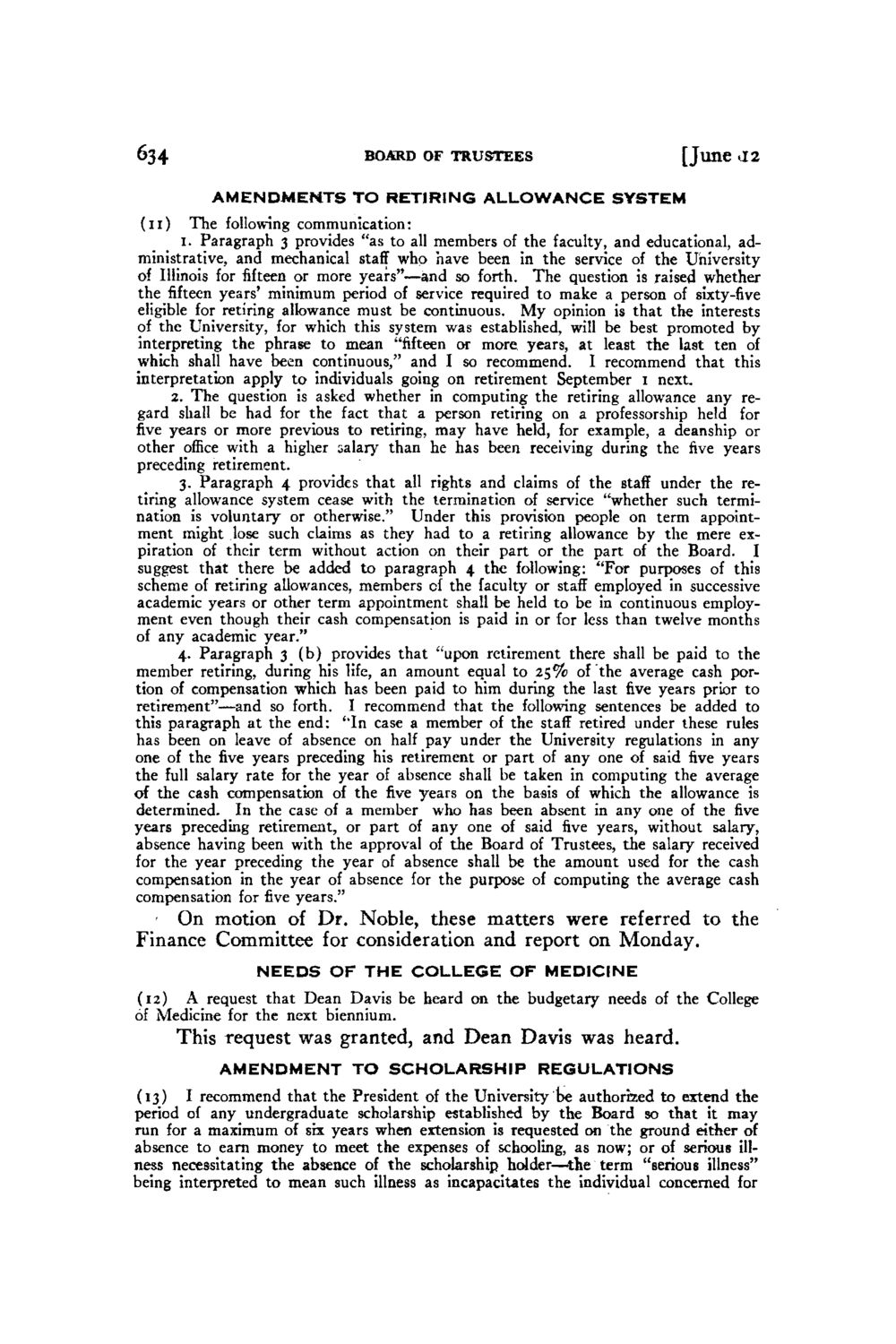| |
| |
Caption: Board of Trustees Minutes - 1926
This is a reduced-resolution page image for fast online browsing.

EXTRACTED TEXT FROM PAGE:
634 BOARD OF TRUSTEES [June a 2 A M E N D M E N T S T O RETIRING A L L O W A N C E SYSTEM (n) The f l o i g communication: olwn I. Paragraph 3 provides "as to a l members of the faculty, and educational, adl ministrative, and mechanical staff who have been in the service of the University of Illinois for fifteen or more years"—and so forth. The question is raised whether the fifteen years' minimum period of service required to make a person of sixty-five eligible for retiring allowance must be continuous. M y opinion i that the interests s of the University, for which this system was established, will be best promoted by interpreting the phrase to mean "fifteen or more years, at least the last ten of which shall have been continuous," and I so recommend. I recommend that this interpretation apply to individuals going on retirement September 1 next. 2. The question i asked whether i computing the retiring allowance any res n gard shall be had for the fact that a person retiring on a professorship held for five years or more previous toretiring,may have held, for example, a deanship or other office with a higher salary than he has been receiving during thefiveyears preceding retirement. 3. Paragraph 4 provides that a l rights and claims of the staff under the rel tiring allowance system cease with the termination of service "whether such termination i voluntary or otherwise." Under this provision people on term appoints ment might lose such claims as they had to a retiring allowance by the mere expiration of their term without action on their part or the part of the Board. I suggest that there be added to paragraph 4 the following: "For purposes of this scheme of retiring allowances, members of the faculty or staff employed in successive academic years or other term appointment shall be held to be in continuous employment even though their cash compensation i paid in or for less than twelve months s of any academic year." 4. Paragraph 3 (b) provides that "upon retirement there shall be paid to the member retiring, during his life, an amount equal to 2 5 % of the average cash portion of compensation which has been paid to him during the lastfiveyears prior to retirement"—and so forth. I recommend that the following sentences be added to this paragraph at the end: "In case a member of the staff retired under these rules has been on leave of absence on half pay under the University regulations in any one of the five years preceding his retirement or part of any one of said five years the full salary rate for the year of absence shall be taken in computing the average of the cash compensation of thefiveyears on the basis of which the allowance i s determined. In the case of a member who has been absent in any one of the five years preceding retirement, or part of any one of said five years, without salary, absence having been with the approval of the Board of Trustees, the salary received for the year preceding the year of absence shall be the amount used for the cash compensation in the year of absence for the purpose of computing the average cash compensation forfiveyears." O n motion of D r . Noble, these matters were referred to the Finance Committee for consideration and report on M o n d a y . NEEDS OF THE COLLEGE OF MEDICINE (12) A request that Dean Davis be heard on the budgetary needs of the College of Medicine for the next biennium. This request w a s granted, and D e a n Davis w a s heard. AMENDMENT TO SCHOLARSHIP REGULATIONS (13) I recommend that the President of the University be authorized to extend th period of any undergraduate scholarship established by the Board so that i may t run for a maximum of six years when extension i requested on the ground either of s absence to earn money to meet the expenses of schooling, as now; or of serious il lness necessitating the absence of the scholarship holder—the term "serious illness" being interpreted to mean such illness as incapacitates the individual concerned for
| |